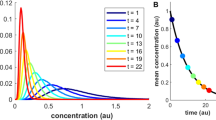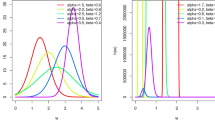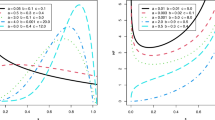Abstract
I WISH to point out that for the statistical analysis of certain types of data the assumption that the data are drawn from a normal population is usually wrong, and that the alternative assumption of a log-normal distribution is better. This alternative is widely used by statisticians, economists and physicists, but for some reason is often ignored by scientists of some other disciplines.
This is a preview of subscription content, access via your institution
Access options
Subscribe to this journal
Receive 51 print issues and online access
$199.00 per year
only $3.90 per issue
Buy this article
- Purchase on SpringerLink
- Instant access to full article PDF
Prices may be subject to local taxes which are calculated during checkout
Similar content being viewed by others
References
McLean, A. E. M., and McLean, E. K., Biochem. J., 100, 564 (1966).
Heath, D. F., and Stoner, H. B., J. Physiol. (submitted for publication).
Hunter, C. G., Robinson, J., and Richardson, A., Brit. Med. J., i, 221 (1963).
Dawson, J. A., Heath, D. F., Rose, J. A., Thain, E. M., and Ward, J. B., Bull. Wld. Hlth. Org., 30, 127 (1964).
Author information
Authors and Affiliations
Rights and permissions
About this article
Cite this article
HEATH, D. Normal or Log-normal: Appropriate Distributions. Nature 213, 1159–1160 (1967). https://doi.org/10.1038/2131159a0
Received:
Revised:
Published:
Issue date:
DOI: https://doi.org/10.1038/2131159a0
This article is cited by
-
trans,trans-Muconic acid, a reliable biological indicator for the detection of individual benzene exposure down to the ppm level
International Archives of Occupational and Environmental Health (1992)
-
Styrene exposure and biologic monitoring in FRP boat production plants
International Archives of Occupational and Environmental Health (1982)
-
Urinary metallothionein as a new index of renal dysfunction in ?itai-itai? disease patients and other Japanese women environmentally exposed to cadmium
Archives of Toxicology (1982)
-
Effects of prochlorperazine on experimental nephrotoxicity
Cancer Chemotherapy and Pharmacology (1982)
-
Biological monitoring of persons exposed to methanol vapours
International Archives of Occupational and Environmental Health (1981)



